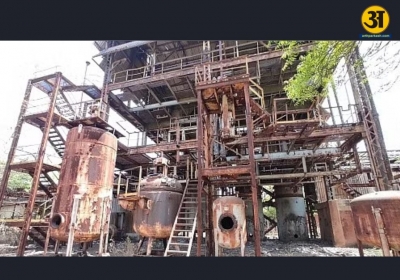.jpg)
Nijjar killing case: trial moved to BC Court
Trial of four Indians accused in Nijjar killing transferred to British Columbia Court
- By Gurmehar --
- Sunday, 24 Nov, 2024
The trial of four Indian nationals charged with the murder of Hardeep Singh Nijjar, a pro-Khalistan activist, has been moved to the British Columbia Supreme Court from Surrey provincial court. The prosecution, known as the Crown in Canada, requested the move for a direct indictment, meaning the accused will skip the preliminary inquiry and go directly to trial. The next appearance for the accused will be on February 11, 2025, when a case management conference is scheduled to arrange pretrial applications and set trial dates.
The four accused individuals, Karan Brar, Kamalpreet Singh, Karanpreet Singh, and Amandeep Singh, were arrested and charged in connection with the murder of Hardeep Singh Nijjar, who was killed on June 18, 2023, in Surrey, Canada. Nijjar’s death triggered significant political tension between India and Canada. Prime Minister Justin Trudeau publicly stated in the Canadian Parliament that there were credible allegations of Indian government involvement in the murder. India strongly rejected these allegations, calling them “absurd” and “motivated.”
Court proceedings and pretrial developments
The Crown’s decision to proceed with a direct indictment means the trial will move faster, bypassing the usual preliminary hearings. This process is expected to save time, but there will still be several pretrial applications to be addressed due to the complexity of the case. These hearings will take place over several months before the trial itself begins. The four accused individuals appeared via video for their first hearing on November 18, 2024, except for Amandeep Singh, who appeared through his lawyer.
The accused are currently being held in custody while awaiting trial. The charges they face include first-degree murder and conspiracy to commit murder. The case has generated significant attention because of its political implications, especially after the allegations of Indian involvement. However, the Canadian authorities have emphasized that the investigation is ongoing, and the focus is on the legal process.
In the months leading up to the move to the British Columbia Supreme Court, there were delays in the case. The provincial court hearings had been adjourned multiple times due to the prosecution’s request for more time to disclose information to the defense lawyers. These delays were to ensure that the defense had all necessary case material to prepare for trial.
The next key date in the case is February 11, 2025, when a case management conference will take place. During this conference, the court will discuss pretrial applications and set the dates for the trial. The length of the pretrial phase is uncertain, as it depends on the complexity of the legal issues that will be addressed before the trial begins. However, this conference will be an important step toward moving the case forward.
The decision to move the case to the higher court also comes with certain restrictions. The court imposed an interim publication ban on pretrial conferences, meaning that details of these hearings cannot be published for the time being. Additionally, the court has limited the ability of the public to attend the court proceedings remotely. These measures are designed to ensure that the legal process is fair and orderly, without unnecessary public pressure or influence.
The murder of Hardeep Singh Nijjar and the subsequent trial of the accused individuals have had significant political ramifications, particularly between India and Canada. Nijjar was a vocal advocate for the Khalistan movement, which seeks to create a separate Sikh state, and his death sparked protests and debates about the role of foreign governments in the matter.
ALSO READ: North Korea trades Soldiers for wildlife: Bears and Lions arrive from Russia
ALSO READ: World’s smallest woman from India meets world’s tallest woman from Turkey
In September 2023, Canadian Prime Minister Justin Trudeau made a statement in the Canadian House of Commons, where he publicly acknowledged that Canadian intelligence agencies had found “credible allegations” that Indian government agents were involved in the murder of Nijjar. This statement was made three months after the murder occurred, and it sent shockwaves through the diplomatic relations between the two countries.
The Indian government quickly rejected these allegations, calling them unfounded and politically motivated. Indian officials accused Canada of trying to interfere in India’s internal affairs, especially given the long-standing issue of Sikh separatism in the region. India’s stance has been that the murder of Nijjar is a criminal matter, and any attempts to link the incident to Indian officials are baseless.
This back-and-forth between the two countries has led to a deterioration of diplomatic relations. India and Canada have exchanged sharp words over the issue, and there has been increased scrutiny of the legal proceedings surrounding the case. As the trial moves forward, both governments are likely to continue watching the case closely, given its sensitive nature and the potential impact on international relations.
The charges against the four accused individuals are severe, and the outcome of the trial could have far-reaching consequences for the political climate between India and Canada. The case has drawn attention not only from the Sikh diaspora but also from political analysts and legal experts who are closely following the developments.
Legal process and next steps
As the trial progresses, the legal process will focus on the details of the charges against the accused. The Crown’s decision to proceed by direct indictment indicates that the prosecution is confident in its case and is eager to move ahead. However, there will be significant legal hurdles to overcome, especially as the defense prepares to challenge the evidence and argue for the innocence of the accused.
In the coming months, both the prosecution and defense will engage in pretrial motions and arguments. These pretrial applications could cover a range of issues, including the admissibility of evidence, the scope of the charges, and the potential for a fair trial. The trial itself is expected to be lengthy, as it will involve complex legal questions and a significant amount of evidence. The public and media will likely continue to follow the case closely, especially given its high profile.
While the exact date for the start of the trial has not yet been set, it is clear that the legal proceedings will unfold over an extended period. The accused individuals will remain in custody during this time, and their legal teams will work to build their defense. The Crown, meanwhile, will continue to gather evidence and prepare its case for trial.
The outcome of this case will not only determine the fate of the accused individuals but also have significant implications for Canada-India relations. As both countries continue to navigate this complex issue, the legal proceedings will be watched closely by governments, diplomats, and citizens alike.





